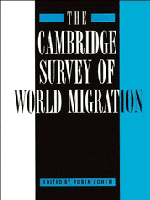Book contents
- Frontmatter
- Contents
- List of illustrations
- List of tables
- Notes on the contributors
- 1 Prologue
- 2 European colonization and settlement
- 3 Asian indentured and colonial migration
- 4 The great Atlantic migration to North America
- 5 Migration in Europe, 1800–1950
- 6 Migration in Africa
- 7 Latin and Central American migration
- 8 Migration to North America after 1945
- 9 Labour migration to western Europe after 1945
- 10 Repatriates and colonial auxiliaries
- 11 Migration in Asia and Oceania
- 12 Migration in the Middle East
- 13 Refugees from political conflict
- 14 Migrants and asylum-seekers in contemporary Europe
- 15 Emerging trends
- Acknowledgements and credits
- Index
10 - Repatriates and colonial auxiliaries
Published online by Cambridge University Press: 05 December 2012
- Frontmatter
- Contents
- List of illustrations
- List of tables
- Notes on the contributors
- 1 Prologue
- 2 European colonization and settlement
- 3 Asian indentured and colonial migration
- 4 The great Atlantic migration to North America
- 5 Migration in Europe, 1800–1950
- 6 Migration in Africa
- 7 Latin and Central American migration
- 8 Migration to North America after 1945
- 9 Labour migration to western Europe after 1945
- 10 Repatriates and colonial auxiliaries
- 11 Migration in Asia and Oceania
- 12 Migration in the Middle East
- 13 Refugees from political conflict
- 14 Migrants and asylum-seekers in contemporary Europe
- 15 Emerging trends
- Acknowledgements and credits
- Index
Summary
The reason why the notion of a ‘repatriate’ seems distant to native English-speakers is that the relevant experience has been unusual in British and American history. However, repatriation has occasioned deep political traumas in other countries. Let me provide some examples. In 1960, the Belgians scrambled out of the Congo amidst scenes of chaos and destruction. Tearful nuns and frightened settlers fled on hastily improvised flights back to Brussels. The following year the UN secretary-general, Dag Hammarskjöld, was tragically killed in an air crash as he tried to intervene in the Congo crisis. The French in Indochina and later in Algeria had to evacuate many French nationals as their own imperial missions came to an end in those countries. Again, these events were of great political moment, as the French army lurched to the right in protest against what it saw as a betrayal by mendacious, weak politicians. The creation of the Fifth Republic in 1958 by de Gaulle was a direct result of the failures in Indochina and Algeria and the repatriation that followed.
In terms of the numbers of repatriates in relation to the natal population, the return of the Portuguese from their African empire is the most startling case. Rocha-Trindade numbers the retornados (as the repatriates were called) at 800,000 – a massive influx compared to the ten million locals. The Portuguese had had a dry run in the 1960s when they were forced to evacuate Goa, but nothing prepared them for the scale and speed (it all happened over the period 1974–9) of the African evacuation.
- Type
- Chapter
- Information
- The Cambridge Survey of World Migration , pp. 321 - 352Publisher: Cambridge University PressPrint publication year: 1995

